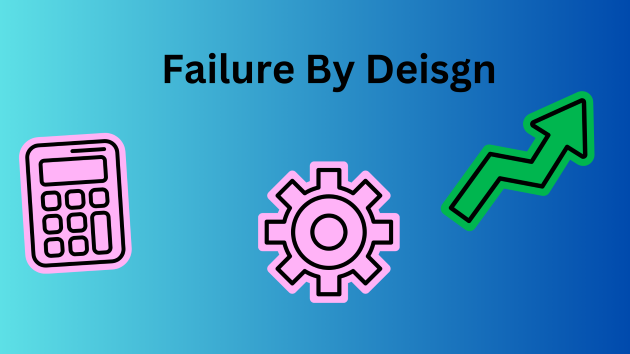Can mistakes in business decisions lead to real success? Can errors in our actions become catalysts for innovation, leadership, and sustainable growth.? In business,we glorify perfection, idolize flawless execution, and obsess over getting things right always. Unfortunately, even with our best efforts, we still commit errors. Mistakes and errors are products of flawed conclusions, based on our confidence in those wrong assumptions we believed to be true. The truth is that mistakes and errors can become catalysts for business growth and innovation. They motivate creativity and allows leaders to stretch beyond their usual limits
No business ever commits errors or makes mistakes intentionally; mistakes are always made in error. Businesses that fear mistakes also fear progress. Real growth is shaped by iterations, failed tests, and tough lessons learned from wrong turns. Failed strategies can lead to better innovation
From global brands to bootstrapped startups in Lagos and Nairobi, many breakthrough innovations, products, and success stories began as blunders, failed launches, rejected ideas, collapsed partnerships, and misunderstood markets.
Mistakes aren’t signs of weakness strategies-for-learning-from-failure—they’re powerful catalysts for innovation, resilience, and lasting success.Companies that embrace them unlock deeper insights, inspire bold thinking, and build fearless cultures of experimentation.
In this article, we’ll explore 10 powerful reasons why mistakes are not setbacks but secret weapons for innovation, leadership maturity, and even profit. You’ll also see how today’s leading companies turned failure into fuel—and how you can too.
If you’re a founder, leader, or entrepreneur aiming to grow smarter and stronger, this shift in mindset might be exactly what your business needs.
But before we dive into those 10 reasons, let’s answer a foundational question: Why do leaders and employees make mistakes, even when the consequences can be costly?
Why Leaders and Employees make Mistakes
All through life, human beings make intentional efforts to avoid mistakes and errors. We go to school to learn “how to do things efficiently and avoid mistakes. We get trained by business consultants and experts on how to avoid mistakes. Parents bring up and advice their children on all rules to avoid mistakes yet, all these efforts still end up in the very action we wanted to avoid. Why?
The simple answer is because mistakes are inevitable. In mistakes and errors lie the very ingredient of our growth. So, no matter how skilled, experienced, or cautious people are, they still make mistakes.

Real Reasons Why Leaders Make Mistakes & Errors:
✅ Complexity of Modern Business: Organizations today operate in fast-changing markets with countless variables: technology shifts, customer preferences, competitor moves. Even the best plans can’t predict every outcome.
✅ Incomplete Information: Decisions often have to be made quickly, with limited data, time and uncertainty. Acting without perfect knowledge is a reality in business and sometimes, it leads to errors.
✅ Human Factors: Cognitive biases, stress, fatigue, and overconfidence can cause lapses in judgment, even among experienced leaders.
✅ Innovation Requires Risk: Trying new ideas, launching products, or entering new markets always involves experimentation. If leaders and employees never made mistakes, it would mean they weren’t innovating or pushing boundaries.
✅ Communication Gaps: Misunderstandings, unclear instructions, or assumptions can easily lead to mistakes, even with well-intentioned teams.
In short: mistakes happen not because people don’t understand the stakes, but because perfect foresight doesn’t exist, and taking action in dynamic environments is inherently risky
10 Reasons Why Mistakes and Errors Are Catalysts for Business Growth and Innovation
The question is: Are Mistakes and Errors inherently bad in business? The answers are Yes and No.
But let’s start with the YES answer to explore why they are necessary and should be permitted if you must grow your organization
Rather than seeing mistakes as landmines to avoid, successful companies treat them as feedback loops and stepping stones. Each misstep provides data to improve systems, refine strategies, or discover untapped opportunities.
There are several benefits of making mistakes in business. Often, growth,innovation,sustainable business strategy, great risk management practices all come from mistakes and errors while attempting to grow
Consider Netflix, which started as a DVD rental service. Early mistakes with customer preferences and pricing helped them pivot toward streaming, transforming them into a global leader.
In contrast, businesses that avoid testing new products or sales strategies out of fear get stuck in old patterns, even as customer preferences shift. Meanwhile, competitors who experiment and learn from mistakes increase revenue and loyalty.
10 Core Reasons Why Mistakes Encourage Growth and Innovation
1. Mistakes Force Clarity and Exposes Gaps
Most business decisions are made on assumptions. A mistake clears the fog. It reveals flawed thinking, exposes blind spots, and forces leaders to rethink their approach. In many cases, a well-handled error is the fastest way to find strategic clarity, especially in complex or new markets
Mistakes and errors reveal flaws in your processes, assumptions, or systems. They shed light on blind spots you’d never identify in a “perfect” plan, empowering you to fix issues before they become catastrophic.
2. Mistakes and Errors Accelerate Learning
Innovation rarely happens in a vacuum; it happens when you try, fail, and refine. If you’re not making mistakes, you’re probably not experimenting enough.
When you get something wrong, you’re forced to dig deeper, reflect, and adapt. This learning from failure creates sharper, more resilient teams who continuously improve.
Some of the greatest products in history, from Post-it Notes to Coca-Cola’s recipe to Gmail, all began with an error or accidental pivot.
3. Errors Build Resilience in Founders and Teams
Every mistake your team survives builds maturity, problem-solving muscle, and confidence. This resilience becomes a core competitive edge in markets where conditions change rapidly (like Nigeria and other emerging economies).
Mistakes make your business emotionally anti fragile. Employees feel safe to try bold ideas, fueling creativity and breakthrough innovations.
4. Errors Reveal Systemic Weaknesses
Sometimes a mistake isn’t the real problem, it’s a symptom of a weak process.
Whether it’s poor onboarding, unclear SOPs, or vague team roles, mistakes spotlight hidden flaws that are costing you money silently. Identifying and fixing them strengthens your business long-term.
5. Failure Engender Adaptation and Inspire Process Improvements
Failure is feedback direct from the market. Every time your product is rejected or your marketing campaign flops, it invites you to listen closer, learn faster, and adapt better.
For example, Sara Blakely, the founder of Spanx, made several mistakes with her initial product prototypes and packaging. But instead of giving up, she used customer feedback to refine and re-launch. Today, she’s a billionaire, and Spanx is a global brand that started with “messy” beginnings.
Smart businesses pay attention to failures, iterate quickly, and win faster than perfectionists.
A single mistake can spark an overhaul of outdated systems, inefficient workflows, or bottlenecks—making your business more agile and competitive.

6. Perfectionism Kills Speed; Mistakes Unlock Momentum
Sometimes, mistakes reveal entirely new directions. Post-it Notes were invented when a scientist failed to create a strong adhesive; instead, he made a reusable, low-tack glue, leading to a billion-dollar product.
The fear of making mistakes keeps many businesses stuck in planning, rehearsing, overthinking. But businesses that allow calculated trial and error move faster, learn sooner, and beat the market to opportunities.
Errors in product design, marketing, or service delivery could provide unfiltered feedback on what customers truly want, giving you the data you need to pivot, improve, or innovate
7. Mistakes Build Authentic Leadership Credibility
A leader who can own their mistake, share what they learned, and bounce back earns more trust than one who pretends they never fail. In a digital world where transparency wins, authenticity matters.
When leaders frame mistakes as part of the process, it shifts your team’s mindset from fear of failure to embracing challenges, bouncing back stronger, and striving for excellence.
Your mistake might just become your best leadership story.
8. Some of the Best Business Ideas Are Born in Failure
That abandoned idea, failed campaign, or “erroneous hire”, can birth something better if you stay open.
In Nigeria, a company and product called Piggyvest, was born out of an attempt to solve another problem. Airbnb, Netflix, Slack, and Spanx were all created as pivots or byproducts of something else going wrong.
9. Mistakes Spark Process and System Innovation
Errors don’t just lead to better outcomes; they also lead to better systems. After every mistake, you get the opportunity to redesign a workflow, automate a task, or create a checklist that saves future time, money, and stress.
Addressing flaws and errors often requires cross-functional collaboration. This teamwork builds trust, breaks down silos, strengthens organizational culture and builds better, more innovative systems
10. Mistakes Make You Think Like a Builder, Not Just a Boss
Ultimately, mistakes force you to build, not just lead. You stop managing outcomes and start crafting better foundations. You begin to ask: “What broke?”, “Why did it happen? ”How do we ensure it never happens again?” That’s how entrepreneurs become architects of better businesses. For growth and innovation to take place, these questions are pertinent but they shouldn’t stifle the growth machine
Most companies play it safe. By encouraging calculated risks and normalizing failure, your business stays ahead—innovating while competitors stand still.
Should Organizations Make Efforts to Avoid Mistakes and Errors?
Absolutely. Organizations should absolutely strive to minimize avoidable mistakes, especially those stemming from negligence, poor communication, or lack of training for business growth and innovation
Investing in clear processes, employee development, and effective systems reduces costly errors.
To reduce the negative impacts of costly experimentation, organizations should
✅ Build systems to catch,analyze, and learn from mistakes early, so small missteps don’t turn into big failures.
✅ Focus on learning-oriented prevention, like clarifying expectations, encouraging questions, and debriefing after errors, not punishing honest mistakes that arise from trying new ideas.
✅ Intentionally build a Culture of Innovation that accommodates guided experimentation
Strategies for Building a Culture of Growth and Innovation
Organizations that transform mistakes into growth adopt these actionable strategies:
✅ Encourage Smart Experimentation: Let employees and leaders try new ideas. Create processes for small-scale tests (pilots, prototypes) so mistakes can be made affordably and lessons learned quickly.
Pilots and prototypes, helps you accept mistakes and errors as investments in learning.
✅Make Psychological Safety a Priority
A culture where people fear blame kills creativity. Create and sustain an environment where it is safe to admit mistakes, share failures, and ask for help. This is the foundation of psychological safety at work, key for high-performing teams.
✅Focus on Solutions, Not Blame
Instead of wasting time assigning fault, analyze what went wrong, focus on what can be improved, and how to prevent similar issues. Turn every mistake into a continuous improvement opportunity. Analyze what went wrong, document insights, and prevent future repeats.
✅Reward Boldness and Initiative
Recognize and celebrate employees who take calculated risks, even when they don’t immediately succeed. This reinforces the importance of innovation in your company culture. Celebrate those who take calculated risks, regardless of immediate outcomes.
✅Document and Share Lessons Learned
Create knowledge-sharing processes so everyone benefits from the learning opportunities that mistakes provide. This institutionalizes growth and prevents repeating the same missteps. Institutionalize learning by documenting mistakes and insights so everyone grows together.
Note however that trying to eliminate all mistakes create a culture of fear, which discourages innovation and experimentation.
The goal isn’t to create a mistake-free organization. It’s to build a learning organization where mistakes become stepping stones to greater performance and innovation.

Examples of How Organizations Turned Errors & Mistakes to Catalysts for Growth and Innovation
- Nigerian Examples: Paystack
Before Paystack became Nigeria’s breakout fintech success, co-founder Shola Akinlade admitted to numerous early mistakes in pricing, product rollout, and investor pitching. Each mistake became a course correction that helped Paystack become more intuitive, simple, and appealing to merchants, eventually leading to a $200M acquisition by Stripe.
- Flutterwave
Mistake: In 2020–2021, Flutterwave experienced reputational and compliance-related challenges, including issues with fraudulent transactions and lapses in KYC (Know Your Customer) practices on its platform. These missteps triggered regulatory scrutiny and public criticism.
Response:
Rather than deny or downplay the errors, Flutterwave took deliberate steps to rebuild trust and improve operational controls:
- Strengthened its compliance infrastructure and transaction monitoring systems.
- Hired senior regulatory and risk experts.
- Rebuilt public trust by increasing transparency in communication, launching high-visibility PR and community-focused campaigns.
Outcome:
Flutterwave not only regained regulatory confidence but went on to:
- Raise $250M in Series D funding at a $3 billion valuation.
- Expand operations across multiple African countries.
- Secure strategic partnerships with global companies like PayPal and Token.io.
Lesson: Their early mistakes became the trigger for operational maturity, compliance innovation, and broader fintech credibility across Africa.
- 🇳🇬 2. IrokoTV
Mistake: IrokoTV initially invested heavily in physical distribution of DVDs and offline content kiosks in an attempt to scale across Nigeria. This physical-first approach was expensive, logistically complex, and didn’t match evolving user behavior.
Response:
Recognizing this strategic misstep, IrokoTV pivoted quickly:
- Shut down physical distribution.
- Reallocated resources to mobile-first, streaming-based delivery.
- Refined its subscription pricing model to suit the Nigerian market’s income and data usage behavior.
Outcome:
This pivot allowed IrokoTV to:
- Grow its mobile app user base across Africa.
- Increase subscriptions and revenue via data-light streaming plans.
- Emerge as one of the most successful African media-tech platforms, often referred to as “the Netflix of Africa.”
Lesson: The failure of their offline model forced IrokoTV to go digital-first—fueling innovation, market fit, and scalable growth
Every great innovation, big or small, has mistakes in its DNA. Whether it’s a startup pivoting based on customer feedback or a retail store adjusting its strategy after a failed promotion, mistakes teach us faster and more effectively than success alone.
Every major innovation, from the lightbulb to modern AI tools, was preceded by dozens or hundreds of “failed” attempts.
Organizations that encourage risk-taking at work and normalize failure are the ones that pioneer new markets and set industry standards
Frequently Asked Questions (FAQs) on Mistakes, Failure, and Business Growth
❓ Is it safe to make mistakes in business in Nigeria’s current economy?
Yes, as long as you learn fast, manage risk, and build structures that absorb the impact. In volatile markets, adaptive learning is more valuable than rigid perfection.
❓ How do I bounce back from a business mistake?
Step back, analyze root causes, extract the lesson, apply the fix, and communicate with transparency (to staff, customers, or partners if needed).
❓ How do I prevent repeating the same mistakes?
Build better systems: checklists, documentation, team debriefs, and accountability. At Steeple Global, we design custom systems to help businesses grow through mistakes — not repeat them
❓ Can failure be a catalyst for growth and learning?
Yes, failure is often the fastest way to learn. When mistakes happen, they force individuals and organizations to re-evaluate assumptions, adapt strategies, and strengthen skills. This cycle of failure ➔ reflection ➔ adjustment is central to the growth mindset in business and accelerates both personal and organizational development.
❓ Why is embracing mistakes Seen as opportunities for growth and innovation important?
Because embracing mistakes empowers teams to experiment and think creatively. Companies that see mistakes as learning opportunities foster a culture of innovation, reduce fear of failure, and discover breakthrough ideas that wouldn’t emerge in risk-averse environments.
❓ Why do companies penalize mistakes?
Many organizations still equate mistakes with incompetence, leading to cultures of blame. This often stems from outdated leadership beliefs, short-term pressure to meet targets, or fear of reputational damage. Unfortunately, penalizing mistakes stifles innovation and discourages initiative, ultimately hurting growth.
❓ Do Nigerian companies tolerate mistakes and errors while growing?
It varies greatly. Traditionally, many Nigerian firms have low tolerance for mistakes due to hierarchical management styles and fear of losing customers or investors. However, progressive startups and growth-oriented businesses in Nigeria are increasingly adopting learning cultures, encouraging experimentation to adapt in competitive markets.
❓ Are failures and errors a key component of growth?
Yes. Mistakes reveal weaknesses in processes, assumptions, and strategies, insights that are invaluable for improving performance. Without errors, companies risk stagnation because they miss critical opportunities to evolve and respond to market changes.
❓ Do mistakes pave the way for success among Nigerian firms?
When Nigerian firms embrace mistakes, they become more agile and innovative. Businesses in Nigeria’s fintech, e-commerce, and retail sectors that learn from missteps often gain a competitive edge, rapidly refining products and strategies to better serve customers.
❓ How can leaders encourage employees to learn from mistakes?
Leaders can model vulnerability by sharing their own mistakes, foster psychological safety at work, reward experimentation, and establish structured post-mortems to turn failures into actionable insights.
❓ What industries benefit most from embracing mistakes?
Industries driven by fast change—like technology, finance, retail, and manufacturing—benefit immensely. These sectors need constant innovation, and experimentation in business is impossible without accepting occasional failures.
❓ Can mistakes improve customer experience?
Yes. Mistakes provide unfiltered feedback on what customers truly want, exposing gaps in service or product design. Companies that listen and adjust based on these mistakes often achieve higher satisfaction and loyalty.
Pro Tip for Businesses
Turn every mistake into a mini case study, analyzing what happened, what was learned, and what’s being changed. Sharing these insights across your organization builds a powerful learning culture and prevents repeated errors.
Conclusion
Mistakes are not obstacles to success—they are the fuel that drives your business forward. Organizations that build a culture of innovation, foster psychological safety, and embrace mistakes as opportunities for learning and growth outperform those stuck in fear.
By understanding the 10 top reasons why errors and mistakes catalyze business growth and innovation, you can turn every misstep into a stepping stones. Remember: avoiding mistakes feels safe, but embracing them builds future-ready organizations.
By encouraging experimentation in business, rewarding boldness, and focusing on solutions instead of blame, you can create an environment where your people feel safe to innovate—and where your business can evolve ahead of the curve. Remember: avoiding mistakes may feel comfortable, but it ultimately limits your potential.
At SteepleGlobal, we help leaders and organizations turn mistakes into momentum. Ready to build a fearless, future-ready organization, redesign your business systems, or just need clarity — Steeple Global helps entrepreneurs build stronger, more mistake-proof businesses.
Contact us today to learn how our proven strategies for embracing mistakes can unlock your company’s full potential.
👉 Contact us at info@steepleglobal.com or Phone/Whatsapp +2348023117931
About the Author
Mike Inyang is a seasoned business consultant, thought leadership ghostwriter, Email Copywriter and Newsletter Copy Writer with over 15 years of experience. Mike helps entrepreneurs, business leaders, startups, and businesses generally to unlock growth through strategy, innovation, and revenue assurance frameworks. Passionate about empowering organizations to build fearless cultures, Mike shares insights that inspire businesses to embrace mistakes as pathways to success. Connect with him on LinkedIn https://www.linkedin.com/in/michaelinyang/ or learn more at https://steepleglobal.com .
#businessGrowth #InnovationInBusiness #EmbracingMistakes #LearningFromFailure #CultureOfInnovation #GrowthMindset #Leadership #Experimentation #RetailInnovation #StartupGrowth #PsychologicalSafety #BusinessStrategy



